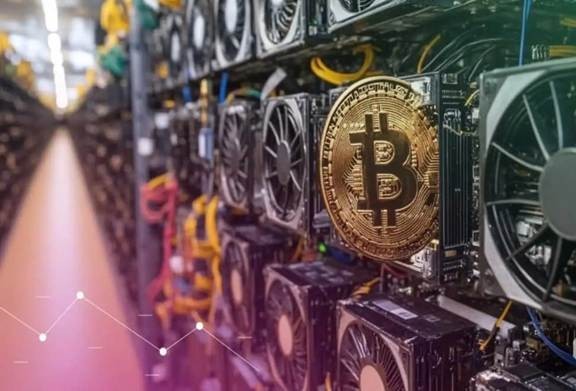
NEW YORK: For about a week, Bitcoin mining firms in Southeast Asia faced an all-consuming deadline, midnight, April 9.
“That time, for the rest of my life, is going to be absolutely etched into my memory,” said Christopher Berschel, president of Sealion Cargo, a Canadian freight forwarding business.
US President Donald Trump had just unveiled an unexpectedly punitive reciprocal tariff plan, slapping duties of 36%, 32% and 24% on Thailand, Indonesia and Malaysia, respectively.
All three have become hubs for the assembly and distribution of crypto mining machines.
US-based buyers of these so-called “rigs” faced a major financial hit – unless Berschel and his crew could get them out by the April 9 cutoff.
In the frenzy that ensued, Sealion helped charter five aircraft while overseeing dozens of trucks and barges to ship US$330 million worth of equipment from Thailand, Malaysia and Indonesia to the US.
“With over US$80 million in potential tariff exposure at stake, every flight, truck, and pallet we touched had one mission: beat the tariff clock,” Berschel said.
Then, on April 9, Trump announced a 90-day pause on the higher tariffs set to hit dozens of trading partners, rendering the entire episode somewhat pointless, albeit costly.
Miners spent as much as four times what they typically might on airfreight and perhaps twenty times the cost of ocean shipping, according to a person familiar with the matter who asked not to be identified as the costs are confidential.
What ultimately turned out to be an unnecessary race to beat the tariff deadline underscores how challenging – and expensive – it’s become for American companies to rework their global supply chains in order to avoid financial pain caused by Trump’s ever-shifting trade policies.
For crypto mining, the tariff threats are especially disruptive since there are few US-made machines that can perform the type of high-performance computing needed to make money in the competitive industry.
It’s all creating a business environment that starkly contradicts the crypto-friendly president’s pledge on the campaign trail to buttress American mining companies such that Bitcoin is “made in the USA”.
Crypto miners depend heavily on Chinese suppliers like Bitmain Technologies Ltd which, while Beijing-based, routes a lot of machinery through Southeast Asia.
Buyers in the US have already faced delays receiving deliveries of new mining equipment since Trump’s election victory amid heightened scrutiny of Bitmain.
Taras Kulyk, CEO at mining hardware supplier and consultant Synteq Digital, said the company has fielded “a lot of inbounds about finding capacity outside the USA over the last two weeks now,” adding that it would be “extremely helpful if the tariff exemptions could be applied to our hardware and infrastructure as well”.
Even so, it’s unclear how long those exemptions will last.
While the US revealed over the weekend that it was excluding a range of electronics from 145% tariffs on China and a 10% flat rate around the globe, Trump later downplayed the exemptions as a procedural step in his push to remold US trade.
He said on Monday that he would still apply tariffs to phones, computers and popular consumer electronics, and that his decision would come soon.
US-listed Bitfufu Inc will remain profitable even if hit by the 24% duty on Malaysian imports, its chairman and CEO Leo Lu said.
“That said, we still hope there will be ways to ease the tariff burden, bring more vitality to the industry and attract more investment into the US mining sector,” Lu added.
Global impact
The race against the clock triggered by Trump’s tariffs wasn’t confined to Asia.
Vishnu Mackenchery, director of global logistics and services at Compass Mining Inc, had to rush 3,000 units over the Canadian border after the April 2 announcement – all while sorting out which parts originated in China, Thailand and elsewhere.
“It’s difficult to make business decisions in this type of climate because of how fluid a lot of the tariffs have been,” Mackenchery said.
“It’s changing not even on a day-to-day basis – it’s changing on an hourly basis,” he said.
Still, Southeast Asia was the heart of the storm. There, the urgency was palpable.
Bitmain has a factory under the name PT Aohai Technology Indonesia on the island of Batam – part of a free trade zone in the region – where it assembles and ships its products, according to two people familiar with the matter.
Bitmain didn’t respond to a request for comment.
EES Freight Services arranged, at just one day’s notice, for a barge full of mining equipment to sail from the Indonesian island to nearby Singapore, where the cargo was loaded onto planes and flown to the US, according to Heru Winata, the firm’s operations director.
EES also chartered a plane to fly machines from Batam to Kuala Lumpur, but encountered delays upon discovering there were no forklifts at the island airport and hence no way to load the aircraft.
Lauren Lin, head of hardware at Luxor Technology, said the firm has brought about 3,000 units – its own and its partners’ – from Thailand to the US since the April 2 announcement.
World Air Logistics managing director Worawut Pakdeesattayaphong had to coordinate 57 truck trips to and from a warehouse near Bangkok to cram three chartered planes with crypto rigs.
Two of the planes took off on April 7 and the third – after what Pakdeesattayaphong described as “non-stop operations” throughout the night – departed on April 8, just in what everyone at that point believed to be the nick of time.
Source: https://www.freemalaysiatoday.com/category/business/2025/04/17/us-tariffs-sparked-rush-to-get-bitcoin-mining-gear-out-of-asia

